21 Jul 2015 | Magazine, mobile
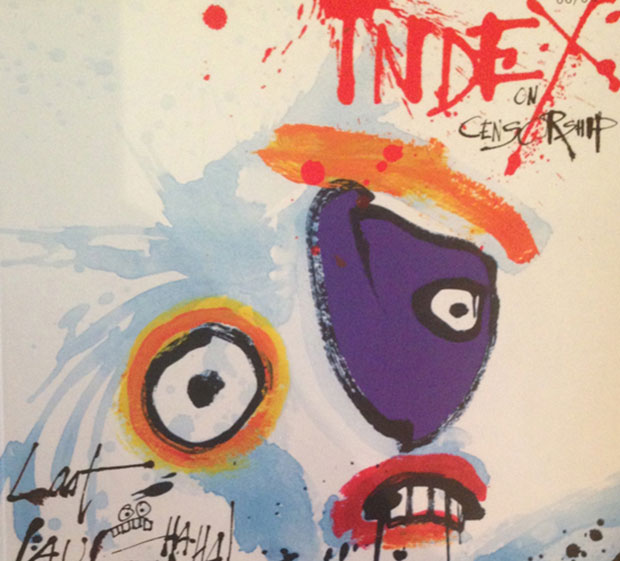
Whenever I’m trying to fill an hour of stand-up for the Edinburgh Festival, the last thing I wonder is, “Jeez, will this set land me a spot on television?” The reasons are twofold: first, I do what makes me laugh, otherwise I get bored; second, I’ve done stand-up on television and it ain’t the apex of my career. Television producers and editors seem to have an uncanny knack for siphoning the humour out of just about anything, especially the royals, and particularly the pretty, dead ones.
Yet television comedy is held in some oddly high regard as a move up for a comic. I guess that’s because if you can’t get a TV profile going, your live shows in the provinces don’t sell very well. Why should someone in, say, Leeds, come and see you at the Varieties if you aren’t good enough to be on Les Dawson?
But to be on Les, or any television programme, your set must be “clean”. Which means few or no dirty words. Misogyny within social norms, fine, but save the word “cunt” for the wife beatings, mate. That’s right. No “cunts”, although the halls of the BBC are teeming with them. Which is sad, since “cunt” is plainly the most versatile word in the English language. It’s a verb, a noun, an adjective, and it’s really the last word on earth that, no matter how it’s used, makes my mother angry. One is also discouraged from using the word “fuck” on television, particularly as a verb. Particularly if you’re gay.
See, as an out cocksucker, there are lots of things I can get away with on stage but, on television, I’m already perceived as dangerous. TV companies treat me, in rehearsal for a taping, as though I’m retarded or a child or, worse yet, American. “Please be nice, Mr Capurro. You want the people watching to like you, don’t you? Good. We wouldn’t want everyone to think that you’re naughty, would we?”
Then they go through the litany of words I’m not supposed to use. When the show is edited and televised, other comics’ “fucks” are left in. Mine are removed. After all, being gay is dirty enough. Do I have to be dirtier with my dirty mouth?
I’m not really complaining. I’ve learned to manoeuvre my way throughout television. I can play the spiky-but-warm, take-the-cock-out-of-my-mouth-and-press-the-tongueto-my-cheek game with squeamishly positive results. Usually. But in Australia, during the taping of a “Gala” to honour a comedy festival in Melbourne, the director had a grand-mal seizure when I described Jesus as a “queerwannabe”. I saw papers fly up over the heads of a stunned, strangely silent audience. Later I found out it was the director’s script. Apparently they found him after the show, huddled in a corner, crying like a recently incarcerated prisoner who’d just taken his first “shower”.
He was afraid I’d pollute minds, I suppose. At least that’s what he told his assistant. So now, TV is promoting itself as a politically correct barometer? A sort of big-eyed nanny looking out for our sensitive sensibilities? In the six years that I’ve been performing in the UK, I’ve seen political correctness catch on like an insidious disease, like a penchant for black, like the need to oppress. Comics use the term to describe their own acts during TV meetings, and everyone around the table nods in appreciation and approval. Or are they choking? I can never tell with TV people.
Maybe they’re suffocating under a pillow of their own stupidity, since no one really understands the meaning behind political correctness, the arch, high-browed stance it panders to. The phrase was coined as a reaction to racism in the US, to respond with a sort of kindness that had been stifled when hippies disappeared from the US landscape. PC took the place of sympathy which has, since Reaganomics, had a negative, sort of “girlie” tone to it that few US politicians, especially those who served in ‘Nam, can tolerate. Being politically correct makes the user feel more in control and smarter, because they can manipulate a conversation by knowing the proper term to describe, say, an American Indian.
‘They’re actually indigenous peoples now,’ a talk-show host in
San Francisco told me while on air recently. ‘The word Indian is
too marginal.’
‘But where are they indigenous to?’
‘Well, here of course.’
‘They’re from San Francisco?’
‘No. I mean, yes. My boss’ — we were discussing his producer, Sam —
‘was born and raised here, but his parents are Cherokee from Kansas. Or
was it his grandparents?’
‘My grandfather is Italian, from Italy. What does that make me?’
‘Good in bed.’
Indigenous, tribal, quasi or semi. All these words are used to describe, politely, “the truth”. But, strangely enough, the truth is camouflaged. The white user pretends to understand the strife of the minorities, their emotional ups and downs, their need for acceptance and understanding, when all the minorities require is fair pay. I’ve never met a struggling Costa Rican labourer who was concerned that he be called a “Latino” as opposed to a “Hispanic”. He just wants to feed his family. Actually, I’ve never met a struggling Costa Rican, period. But that’s because I’m one of the annoying middle class who keep a distance from anyone who’s not like them, but who also has the time and just enough of an education to make up words and worry about who gets called what.
To the targets, the people we’re trying to protect – the downtrodden, the homeless, the forgotten – we must appear naive and bored, like nuns. It’s a lesson in tolerance that’s become intolerant. As if to say: “If you don’t think this way, if you don’t think that a black person from Bristol is better off being called Anglo-African, you’re not only wrong, you’re evil!” It’s pure fascism, plain and simple. It’s as if Guardian readers had unleashed their consciousness on everybody else, and so it’s naughty to make jokes about blacks, unless you’re black, and bad to make fun of fat people, if you’re not fat, etc. Suddenly, everyone is tiptoeing around everyone else, frightened they’ll be labelled racist because they use the word “Jew” in a punchline. Or horrified someone will think them misogynist because they think women deal better with stress.
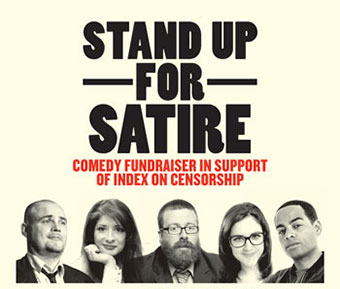 Index on Censorship has been publishing articles on satire by writers across the globe throughout its 43-year history. Ahead of our event, Stand Up for Satire, we published a series of archival posts from the magazine on satire and its connection with freedom of expression.
Index on Censorship has been publishing articles on satire by writers across the globe throughout its 43-year history. Ahead of our event, Stand Up for Satire, we published a series of archival posts from the magazine on satire and its connection with freedom of expression.
14 July: The power of satirical comedy in Zimbabwe by Samm Farai Monro | 17 July: How to Win Friends and Influence an Election by Rowan Atkinson | 21 July: Comfort Zones by Scott Capurro | 24 July: They shoot comedians by Jamie Garzon | 28 July: Comedy is everywhere by Milan Kundera | Student reading lists: Comedy and censorship

Somehow we’ve forgotten that it’s all in how you say it. To read a brilliant stand-up comic’s act is pedantic, but to see it performed is breathtaking. That’s because what we say might be clever, but the way we arrange and self-analyse and present is where the fun comes in. Same with all those words we use. They’re not “racist” or “dangerous” by definition.
Speaking of definitions, let’s talk about the word “gay”. Lots of people I meet are concerned about what I should be called. Is it gay, which pleases the press, or queer, which pleases the hetero hip, since they think gays are trying to reclaim that word? The fact is that all those words are straight-created straight identifiers. Gay is a heterosexual concept. It’s a man who looks like a model, dresses like a model and has the brain of a model. He has disposable income, he loves to travel, and he adores – thinks he sometimes is – Madonna. He’s a teenage girl really and straights love objectifying him the -way they do teenage girls. Or the way they do infants. Try watching a diaper commercial with the sound off. It’s like porn. You’ll think you’re in a bar in Amsterdam.
I’m about as comfortable with the word “gay” as I am with kiddy porn. I’d prefer to be called a comic. Not a gay comic. Not a queer comic. Not even a gay, queer comic, or a fierce comic, or an alternative comic. It’s just the mainstream trying to pigeonhole me, trying to say, OK, he’s gay, so it’s OK to laugh at his stuff about gays. Which is why, partially, in my act, I make fun of the Holocaust by saying “Holocaust, schmolocaust, can’t they whine about something else?”
The line is meant to be ambiguous, initially. It’s meant to start big, and then the actual subject gets small, as I discuss ignorance about the pink triangle as a symbol of oppression, which has since been turned into a fashion accessory. Like the red ribbon, it makes the PC brigade feel like they’ve done their part to ease hatred in the world by adorning their lapel with a pin. When pressed, they’re not even sure what oppression they’re curing, or why they should cure oppression, or how they’re oppressed.
But if you make fun of that triangle, or this Queen Mum, or that dead Princess, suddenly you’re — why mince — I’m the bad guy. I’ve broken away from the pack. I’m not acting like a good little queer should. I’m not being silent about issues that don’t concern a modern gay man, like hair-dos and don’ts. I’m being aggressive, I’m on to. And those straights, those in charge, the folks looking after “my minority group”, don’t like rolling over.
Nor are some cocksucking idiots happy about being bottom-feeders either. Which is why I come out against abortion in my act, and in support of the death penalty since, in the US at least, the two go hand in manicured hand. There I go, losing my last supporters: young women and single gay men. How can I say: “If you wanna talk Holocaust, how about abortion, ladies? 50 million. Can you maybe keep your legs together?”
That is truly evil. No, not really evil. Just wrong. Why? Particularly when I’m only opposed to abortion as a contraceptive device. Who decides what I can and cannot say? Isn’t it the people that aren’t listening? If I’ve got a good joke about it, a well-thought-out attack and a point to make, why is it bad? Why is the world dumbing down almost as fast as Woody Allen’s films? Why does it bother me? Why not just do my same old weenie jokes, keep playing the clubs and sleep with closeted straight comics? Just doing those three things – particularly the last – would keep me very busy and distracted, which is what “life” is all about.
But I imagine that when people go for a night out, they wanna see something different. It’s a big deal finding a babysitter, getting a cab, grabbing a bite and sitting your tired ass into a pricey seat to hear some faggot rattle on for an hour. So I try to offer them a unique perspective. One that might seem overwrought, desperate, or strangely effortless, but one that might make them look at, say, an Elton John photo just a bit differently next time
Look, it’s not my job to find anyone’s comfort zones. I don’t give a shit what people like, or think they like, or want to like. I’m not a revolutionary. I’m just a joke writer with an hour to kill, who wants to elevate the level of intelligence in my act to at least that of the audience.
If in doing that, I get a beer thrown at me or I lose a “friend” (read: jealous comic) then so be it. In the meantime, I’ll keep fending off my growing array of fans that are sick and tired of being lied to and patronised.
Gosh, get her! I mean me. Get me, sounding all holier than, well, everybody. Strangely enough, the more I find my voice on stage, the more serious comedy becomes for me. Maybe I should go back to telling those “Americans are so silly” jokes before I lose my mind, and throw all my papers up in the air.
Scott Capurro is a San Francisco-based stand-up whose performance at the
Edinburgh Fringe in August ended in uproar after he ‘made jokes’ about the
Holocaust. His book, Fowl Play, was published by Headline in September
1999
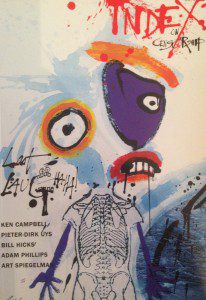
This article is from the November/December 2000 issue of Index on Censorship magazine and is part of a series of articles on satire from the Index on Censorship archives. Subscribe here, or buy a single issue. Every purchase helps fund Index on Censorship’s work around the world. For reproduction rights, please contact Index on Censorship directly, via [email protected]
17 Jul 2015 | Magazine, mobile
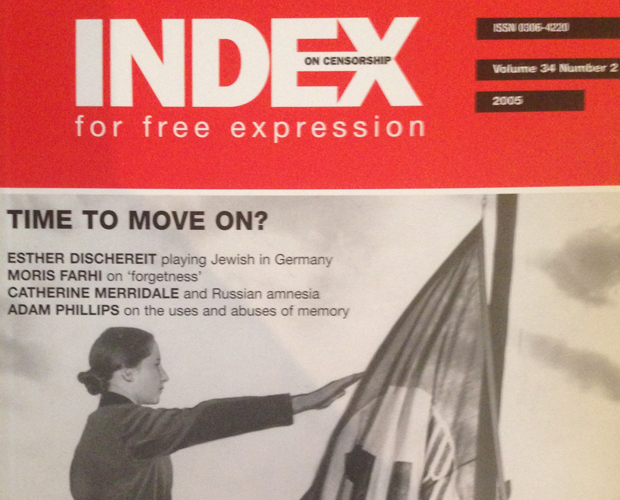
Index on Censorship magazine cover, May 2005
On behalf of all those who make a living from creativity, those whose job it is to analyse, to criticise and to satirise – authors, journalists, academics, actors, politicians and comedians – I oppose the government’s proposed law of Incitement of Religious Hatred. The government claims we need have no concerns about the legislation but as the arguments both for and against the measure have evolved, I have found these reassurances to lack any logic or conviction.
First, there is the government’s belief that the measure will promote racial tolerance. Now racial tolerance may sound a pretty inarguable notion. Unfortunately, what is very arguable is the definition of the term – the definition of a tolerant society. Is a tolerant society one in which you tolerate absurdities, iniquities and injustices simply because they are being perpetrated by or in the name of a religion? Or one where out of a desire not to rock the boat you pass no comment or criticism? Or is a tolerant society one where, in the name of freedom, the tolerance that is promoted is the tolerance of occasionally hearing things you don’t want to hear? Of reading things you don’t want to read? A society in which one is encouraged to question, to criticise and if necessary to ridicule any ideas and ideals, and where the holders of those ideals have an equal right to counter-criticise, to counter-argue and to make their case? That is my idea of a tolerant society: an open and vigorous one, not one that is closed and stifled in some contrived notion of correctness.
I question, also, the ease with which the existing race hatred legislation is going to be extended simply by the scoring out of the word “racial hatred” and the insertion of “racial or religious hatred” as if race and religion are very similar ideas and we can bundle them together in one big lump. It seems clear to me and to most people that race and religion are fundamentally different concepts, requiring completely different treatment under the law. To criticise people for their race is manifestly irrational but to criticise their religion, that is a right. That is a freedom. The freedom to criticise ideas – any ideas – even if they are sincerely held beliefs, is one of the fundamental freedoms of society. A law that attempts to say you can criticise or ridicule ideas as long as they are not religious ideas is a very peculiar law indeed. It promotes the idea that there should be a right not to be offended. Yet in my view, the right to offend is far more important than any right not to be offended simply because one represents openness, the other oppression.
Third, I question the inarguable nature of the phrase “religious hatred” afforded by the use of the highly emotive word “hatred”. So I thought I would modify the name of the proposed measure by changing the terminology while retaining the meaning. The dictionary definition of the word “hatred” is “intense dislike”. Incitement of Religious Intense Dislike. Isn’t it strange how that small change makes it seem a much less desirable or necessary measure? I then found myself asking a strange question. What is wrong with encouraging intense dislike of a religion? Why shouldn’t you do so if the beliefs of that religion or the activities perpetrated in its name deserve to be intensely disliked? What if the teaching or beliefs of the religion are so outmoded, hypocritical and hateful that not expressing criticism of them would be perverse? The government claims that one would be allowed to say what one liked about beliefs because the measure is not intended to defend beliefs but believers. But I don’t see how you can distinguish between them. Beliefs are only invested with life and meaning by believers. If you attack beliefs, you are automatically attacking those who believe the beliefs. You wouldn’t need to criticise the beliefs if no one believed them.
 Index on Censorship has been publishing articles on satire by writers across the globe throughout its 43-year history. Ahead of our event, Stand Up for Satire, we published a series of archival posts from the magazine on satire and its connection with freedom of expression.
Index on Censorship has been publishing articles on satire by writers across the globe throughout its 43-year history. Ahead of our event, Stand Up for Satire, we published a series of archival posts from the magazine on satire and its connection with freedom of expression.
14 July: The power of satirical comedy in Zimbabwe by Samm Farai Monro | 17 July: How to Win Friends and Influence an Election by Rowan Atkinson | 21 July: Comfort Zones by Scott Capurro | 24 July: They shoot comedians by Jamie Garzon | 28 July: Comedy is everywhere by Milan Kundera | Student reading lists: Comedy and censorship

I also take issue with the government’s consultation process. After the initial failure to get the law passed in 2001, it engaged in a consultation process involving a House of Lords Select Committee and, I believe, another forum in which it was discussed, to arrive at a new version of the measure that was launched last autumn. What I find extraordinary is that the government is so wedded to the notion that nobody other than the most rabid fascists could possibly fall foul of this legislation that the consultation process didn’t include anyone from the creative community. Many organisations were consulted in the drafting of this legislation: religious organisations, civil liberties groups, law enforcement people; but not one writer, not one journalist, not one academic, not one television producer, theatrical producer; no actor, no comedian; basically nobody whose work might be affected by it. How weird this denial of those concerns, when the incident that most inspired those who have been seeking the introduction of this legislation was the publication of a book. And the most vociferous religious protests we have seen in Britain in the past few months have been against a play and a televised opera. Again, the government will say that these creative works are not the intended targets of this legislation but that raises two issues: first, many religious organisations think they are precisely the target and look forward to wielding their influence to bring prosecutions. If their ambitions are thwarted, there is a high risk of a violent reaction; second, the government is unable to say that creative endeavours could not possibly be targets. And the reason ministers can’t give that degree of reassurance is because creative endeavours clearly could be. Comedy could. Newspaper articles could. Theatrical plays could. The legislation is very simple, very clear and very broad.
The government is relying entirely on the wisdom of the attorney general to protect people like me. It is this discretionary nature of the legislation that is arguably the most disturbing thing about it. It allows the government to rubbish the concerns of the creative community without offering any concrete reassurances other than that the attorney general will look after you. What kind of reassurance is that? The attorney general is not an independent adjudicator. He is an instrument of government: what is politically expedient will be his guide. As the 9/11 attacks on the United States showed, the political agenda in any country can change in a matter of hours. Who’s to say what his priorities are going to be in five days’ time, or five hours’ time, or five years’ time? The government’s belief that legislation on religious hatred will work just as that on racial hatred does is optimistic in the extreme. The pressures in relation to religious hatred are going to be on a completely different scale from that for race: the spread of fundamentalism across a whole range of religions is going to make the issue politically far more highly charged.
And even if I had faith that the attorney general would bail me out in the end, what would I have to go through first? I don’t particularly want to discover that my comedy revue has not, after all, fallen foul of the legislation sitting in an interview room in Paddington Green police station. I would like to know that I could not possibly be put in that situation because of my criticism or ridicule of religious ideas and, by implication, those who follow those ideas. And we now know that even the attorney general’s judgments can be subjected to judicial review. Where would it end?
However, we have to address the issues that have driven the government to their current position. We have to sympathise and empathise with the most conspicuous promoters of this legislation, British Muslims. I appreciate that this measure is an attempt to provide comfort and protection to them but unfortunately it is a wholly inappropriate response far more likely to promote tension between communities than tolerance. The government could have worded the document to tackle a specific issue but chose not to; as a result, those caught in the crossfire are reluctantly going to have to fight to defend intellectual curiosity, the right to criticise ideas, whatever form they take, and the right to ridicule the ridiculous, in whatever context that lies. These ramifications are being denied by the government because it is politically expedient for them to do so, but I personally have been reassured by nothing I have seen, heard or read.
I don’t doubt the sincerity of those who are seeking this legislation but I do question the government’s enthusiasm for it so close to a general election, an enthusiasm that must be rooted in its belief that this measure could help its cause in some marginal constituencies with large religious populations, many of whom are critical of the government’s prosecution of the war in Iraq. It seems a shame we have to be robbed permanently of one of the pillars of freedom of expression because it’s needed temporarily to shore up a wobbling political edifice elsewhere.
Rowan Atkinson is a foremost British comedian and actor. This is the speech he gave in the Moses Room at the House of Lords on 25 January 2005
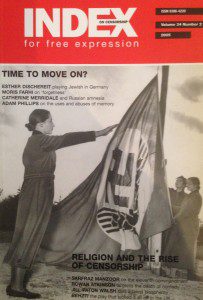 This article is from the spring 2005 issue of Index on Censorship magazine and is part of a series of articles on satire from the Index on Censorship archives. Subscribe here, or buy a single issue. Every purchase helps fund Index on Censorship’s work around the world. For reproduction rights, please contact Index on Censorship directly, via [email protected]
This article is from the spring 2005 issue of Index on Censorship magazine and is part of a series of articles on satire from the Index on Censorship archives. Subscribe here, or buy a single issue. Every purchase helps fund Index on Censorship’s work around the world. For reproduction rights, please contact Index on Censorship directly, via [email protected]
9 Jun 2015 | Academic Freedom, Magazine, Volume 44.02 Summer 2015
[vc_row][vc_column][vc_custom_heading text=”What is the state of academic freedom in 2015? Index on Censorship magazine’s summer 2015 issue takes a global vantage point to explore all the current threats – governmental, economic and social – faced by students, teachers and academics. “][vc_row_inner][vc_column_inner width=”1/2”][vc_column_text]
In the UK and US, offence and extremism are being used to shut down debates, prompting the adoption of “no-platforming” and “trigger-warnings”. In Turkey, an exam question relating to the Kurdish movement led to death threats for one historian. In Ireland, there are concerns over the restraints of corporate-sponsored research. In Mexico, students are being abducted and protests quashed.
[/vc_column_text][/vc_column_inner][vc_column_inner width=”1/2″][vc_single_image image=”66714″ img_size=”full”][/vc_column_inner][/vc_row_inner][vc_column_text]
Plus we have reports on Ukraine, China and Belarus, on how education is expected to toe an official line. Also in this issue: Sir Harold Evans, AC Grayling, Tom Holland and Xinran present their free-speech heroes. Ken Saro-Wiwa Junior introduces a previously unpublished letter from his activist father, 20 years after he was executed by the Nigerian state, and Raymond Joseph reports on the dangers faced by Africa’s environmental journalists today. Comedian Samm Farai Monro, aka Comrade Fatso, looks at the rise of Zimbabwean satire; Matthew Parris interviews former UK attorney general Dominic Grieve; Italian journalist Cristina Marconi speaks to Marina Litvinienko, wife of the murdered KGB agent Alexander; and Konstanty Gebert looks at why the Polish Catholic church is upset by Winnie the Pooh and his non-specific gender.
Our culture section presents exclusive new short stories by exiled writers Hamid Ismailov (Uzbekistan) and Ak Welaspar (Turkmenistan), and poetry by Musa Okwonga and Angolan journalist Rafael Marques de Morais. Plus there’s artwork from Martin Rowson, Bangladeshi cartoonist Tanmoy and Eva Bee, and a cover by Ben Jennings.
[/vc_column_text][/vc_column][/vc_row][vc_row][vc_column][vc_custom_heading text=”SPECIAL REPORT: FIRED, THREATENED AND IMPRISONED” css=”.vc_custom_1483456198790{margin-right: 0px !important;margin-left: 0px !important;border-bottom-width: 1px !important;padding-top: 15px !important;padding-bottom: 15px !important;border-bottom-color: #455560 !important;border-bottom-style: solid !important;}”][vc_column_text]
Is academic freedom being eroded?
Silence on campus – Kaya Genç explores why a Turkish historian received death threats for writing an exam question
Universities under fire in Ukraine’s war – Tatyana Malyarenko unveils how Ukrainian scholars have to prove their patriotism in front of a special committee
Industrious academics – Michael Foley looks at how the commercial pressures on Ireland’s universities and students is narrowing research
Stifling freedom – Mark Frary’s take on 1oo years of attacks on US academic freedom
Ideas under review – Lawyer and journalist Suhrith Parthasarathy looks at how the Indian government interfering with universities’ autonomy. Also Meena Vari asks if India’s most creative artistic minds are being stifled
Girls standing up for education – Three young women from Pakistan, Uganda and Nigeria on why they are fighting for equality in classrooms
Open-door policy – Professor Thomas Docherty examines the threats to free speech in UK universities. Plus the student’s view, via the editor of Cambridge’s The Tab new site
Mexican stand-off – After the abduction of 43 students, Guadalajara-based journalist Duncan Tucker looks at the aftermath and the wider picture
Return of the red guards – Jemimah Steinfeld reports on the risks faced by students and teachers who criticise the government in China
[/vc_column_text][/vc_column][/vc_row][vc_row][vc_column][vc_custom_heading text=”IN FOCUS” css=”.vc_custom_1481731813613{margin-right: 0px !important;margin-left: 0px !important;border-bottom-width: 1px !important;padding-top: 15px !important;padding-bottom: 15px !important;border-bottom-color: #455560 !important;border-bottom-style: solid !important;}”][vc_column_text]
Pride and principles – Matthew Parris in conversation with the former UK attorney general Dominic Grieve
A letter from Ken Saro-Wiwa – A moving tribute from the son of one of the Ogoni nine and a previously unpublished letter from his father who was killed in Nigeria 20 years ago
Hunt and trap – Raymond Joseph reports on the dangers currently being faced by Africa’s environmental journalists
Litvinienko’s legacy – Italian journalist Cristina Marconi speaks to Marina Litvinienko, wife of the murdered KGB agent Alexander
God complex – Konstanty Gebert looks at why the Polish Catholic church is so worried about Winnie the Pooh’s gender
Zuma calls media ‘unpatriotic’ – Professor Anton Harber speaks to Natasha Joseph about the increasing political pressure on South African journalism
Dangers of blogging in Bangladesh – Vicky Baker on the recent murders of Bangladeshi bloggers by fundamentalists, plus a cartoon by Dhaka Tribune’s Tanmoy
Comedy of terrors – Samm Farai Monro, aka Comrade Fatso, on the power of Zimbabwe’s comedians to take on longstanding political taboos
Print under pressure – Miriam Mannak reports on the difficulties facing the media in Botswana, as the president tightens his grip on power
On forgotten free speech heroes – Sir Harold Evans, AC Grayling, Tom Holland and Xinran each pick an individual who has made a telling contribution to free speech today
Head to head – Lawyer Emily Grannis debates with Michael Halpern on whether academic’s emails should be in the public domain
[/vc_column_text][/vc_column][/vc_row][vc_row][vc_column][vc_custom_heading text=”CULTURE” css=”.vc_custom_1481731777861{margin-right: 0px !important;margin-left: 0px !important;border-bottom-width: 1px !important;padding-top: 15px !important;padding-bottom: 15px !important;border-bottom-color: #455560 !important;border-bottom-style: solid !important;}”][vc_column_text]
The pain of exile – Exclusive new fiction from Uzbek writer Hamid Ismailov, who has not only had all his books banned back in his homeland, but every mention of his name
Eye of the storm – A poem by Musa Okwonga on the importance of allowing offensive views to be heard and debated on university campuses
The butterfly effect – The lesser known poetry of Index award-winner Rafael Marques De Morais
Listening to a beating heart – A new short story from Ak Welsapar, an author forced to flee his native Turkmenistan after being declared an enemy of the people
[/vc_column_text][/vc_column][/vc_row][vc_row][vc_column][vc_custom_heading text=”COLUMNS” css=”.vc_custom_1481732124093{margin-right: 0px !important;margin-left: 0px !important;border-bottom-width: 1px !important;padding-top: 15px !important;padding-bottom: 15px !important;border-bottom-color: #455560 !important;border-bottom-style: solid !important;}”][vc_column_text]
Global view – Index’s CEO Jodie Ginsberg on the difficulties of measuring silenced voices
Index around the world – An update on Index’s latest work
[/vc_column_text][/vc_column][/vc_row][vc_row][vc_column][vc_custom_heading text=”END NOTE” css=”.vc_custom_1481880278935{margin-right: 0px !important;margin-left: 0px !important;border-bottom-width: 1px !important;padding-top: 15px !important;padding-bottom: 15px !important;border-bottom-color: #455560 !important;border-bottom-style: solid !important;}”][vc_column_text]
Battle of the bots – Vicky Baker reports on the fake social media accounts trying to silence online protest
[/vc_column_text][/vc_column][/vc_row][vc_row][vc_column][vc_custom_heading text=”SUBSCRIBE” css=”.vc_custom_1481736449684{margin-right: 0px !important;margin-left: 0px !important;border-bottom-width: 1px !important;padding-bottom: 15px !important;border-bottom-color: #455560 !important;border-bottom-style: solid !important;}”][vc_column_text]Index on Censorship magazine was started in 1972 and remains the only global magazine dedicated to free expression. Past contributors include Samuel Beckett, Gabriel García Marquéz, Nadine Gordimer, Arthur Miller, Salman Rushdie, Margaret Atwood, and many more.[/vc_column_text][vc_row_inner][vc_column_inner width=”1/2″][vc_single_image image=”76572″ img_size=”full”][/vc_column_inner][vc_column_inner width=”1/2″][vc_column_text]In print or online. Order a print edition here or take out a digital subscription via Exact Editions.
Copies are also available at the BFI, the Serpentine Gallery, MagCulture, (London), News from Nowhere (Liverpool), Home (Manchester), Calton Books (Glasgow) and on Amazon. Each magazine sale helps Index on Censorship continue its fight for free expression worldwide.
 SUBSCRIBE NOW[/vc_column_text][/vc_column_inner][/vc_row_inner][/vc_column][/vc_row]
SUBSCRIBE NOW[/vc_column_text][/vc_column_inner][/vc_row_inner][/vc_column][/vc_row]
15 Oct 2014 | Press Releases, Uncategorized
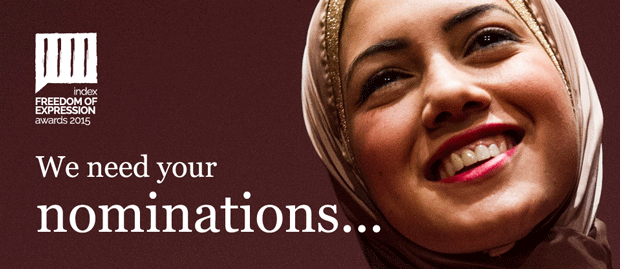
- Awards honour journalists, campaigners and artists fighting censorship globally
- Judges include journalist Mariane Pearl and human rights lawyer Sir Keir Starmer
- Nominate at www.indexoncensorship.org/nominations
Beginning today, nominations for the annual Index on Censorship Freedom of Expression Awards 2015 are open. Now in their 15th year, the awards have honoured some of the world’s most remarkable free expression heroes – from Israeli conductor Daniel Barenboim to Syrian cartoonist Ali Farzat to education activist Malala Yousafzai.
The awards shine a spotlight on individuals fighting to speak out in the most dangerous and difficult of conditions. As Idrak Abbasov, 2012 award winner, said: “In Azerbaijan, telling the truth can cost a journalist their life… For the sake of this right we accept that our lives are in danger, as are the lives of our families. But the goal is worth it, since the right to truth is worth more than a life without truth.” Pakistani internet rights campaigner Shahzad Ahmad, a 2014 award winner, said the awards “illustrate to our government and our fellow citizens that the world is watching”.
Index invites the public, NGOs, and media organisations to nominate anyone they believe deserves to be part of this impressive peer group: a hall of fame of those who are at the forefront of tackling censorship. There are four categories of award: Campaigner (sponsored by Doughty Street Chambers); Digital Activism (sponsored by Google); Journalism (sponsored by The Guardian), and the Arts. Nominations can be made online via http://www.indexoncensorship.org/nominations
Winners will be flown to London for the ceremony, which takes place at The Barbican on March 18 2015. In addition, to mark the 15th anniversary of the Freedom of Expression awards, Index is inaugurating an Awards Fellowship to extend the benefits of the award. The fellowship will be open to all winners and will offer training and support to amplify their work for free expression. Fellows will become part of a world-class network of campaigners, activists and artists sharing best practice on tackling censorship threats internationally.
Jodie Ginsberg, CEO of Index, said: “The Index Freedom of Expression Awards is a chance for those whom others try to silence to have their voices heard. I encourage everyone, no matter where they are in the world, to nominate a free expression hero.”
The 2015 awards shortlist will be announced on January 27th 2015. Judges include journalist Mariane Pearl and human rights lawyer Sir Keir Starmer. The public will be asked to participate in selecting the winner of the Google Digital Activism award through a public vote beginning January 27th 2015. Sir Keir said: “Freedom of expression is part of the bedrock of civilised, democratic society. The Index on Censorship Awards have a material influence on promoting such freedom and both celebrating and protecting those who fight against censorship worldwide. That’s why Doughty Street Chambers chooses Index as its principal charity.”
For more information please contact David Heinemann: [email protected]
_______________________________________________________________________
NOTES FOR EDITORS
About Index on Censorship:
Index on Censorship is an international organisation that promotes and defends the right to freedom of expression. The inspiration of poet Stephen Spender, Index was founded in 1972 to publish the untold stories of dissidents behind the Iron Curtain and beyond. Today, we fight for free speech around the world, challenging censorship whenever and wherever it occurs. Index believes that free expression is the foundation of a free society and endorses Article 19 of the Universal Declaration of Human Rights, which states: “Everyone has the right to freedom of opinion and expression.”
About The Index on Censorship Freedom of Expression Awards:
The Index Freedom of Expression Awards recognise those deemed to be making the greatest impact in tackling censorship in their chosen area.
Awards categories:
Journalism – for impactful, original, unwavering journalism across all media (sponsored by The Guardian).
Campaigner – for campaigners and activists who have fought censorship and who challenge political repression (sponsored by Doughty St Chambers).
Digital Activism – for innovative uses of new technology to circumvent censorship and foster debate (sponsored by Google).
Arts – for artists and producers whose work asserts artistic freedom and battles repression and injustice.
Previous award winners include:
Journalism: Azadliq (Azerbaijan), Kostas Vaxevanis (Greece), Idrak Abbasov (Azerbaijan), Ibrahim Eissa (Egypt), Radio La Voz (Peru), Sunday Leader (Sri Lanka), Arat Dink (Turkey), Kareen Amer (Egypt), Sihem Bensedrine (Tunisia), Sumi Khan (Bangladesh), Fergal Keane (Ireland), Anna Politkovskaya (Russia), Mashallah Shamsolvaezin (Iran)
Digital/New Media: Bassel Khartabil (Palestine/Syria), Freedom Fone (Zimbabwe), Nawaat (Tunisia), Twitter (USA), Psiphon (Canada), Centre4ConstitutionalRights (US), Wikileaks
Advocacy: Malala Yousafzai (Pakistan), Nabeel Rajab (Bahrain), Gao Zhisheng (China), Heather Brooke (UK), Malik Imtiaz Sarwar (Malaysia), U.Gambira (Burma), Siphiwe Hlope (Swaziland), Beatrice Mtetwa (Zimbabwe), Hashem Aghajari (Iran)
Arts: Zanele Muholi (South Africa), Ali Farzat (Syria), MF Husain (India), Yael Lerer/Andalus Publishing House (Israel), Sanar Yurdatapan (Turkey)
You have received this email because email address ‘[email protected]’ is subscribed to ‘AWARDS 2015 Call For Nominations’.

 Index on Censorship has been publishing articles on satire by writers across the globe throughout its 43-year history. Ahead of our event, Stand Up for Satire, we published a series of archival posts from the magazine on satire and its connection with freedom of expression.
Index on Censorship has been publishing articles on satire by writers across the globe throughout its 43-year history. Ahead of our event, Stand Up for Satire, we published a series of archival posts from the magazine on satire and its connection with freedom of expression.




